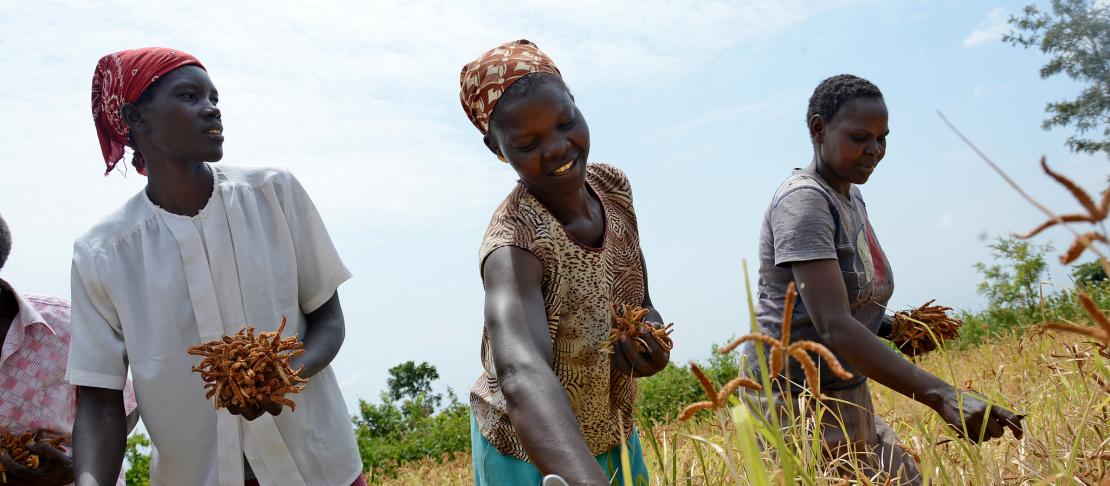The future of farming: The potential of young people in the agriculture sector

Climate change and the youth's lack of interest in farming threatens the agriculture sector. A recent webinar examined ways to engage them in climate-smart agriculture in a profitable way.
Worldwide, millions of young people are unable to find meaningful, stable, and well-paying sources of income, with an estimated 73 million young people currently looking for work. In some regions, such as Latin America, the Middle East, and North Africa, youth unemployment remains staggeringly high. While the youth unemployment rate in Sub-Saharan Africa has improved, young people continue to struggle to find stable, well-paying jobs. In the Asia-Pacific region, young people are often underemployed.
The issue is especially detrimental to developing countries, where youth unemployment restricts earnings and career trajectories, constraining individual incomes and limiting economic development for a generation. Additionally, limited economic opportunities in rural communities are major catalysts for outmigration, draining communities of the vitality and innovation of their young people. While agriculture is a major source of employment in rural areas, a number of factors - including lack of capital, limited access to information, and low pay – means that young people are less attracted than ever to farming.
Climate change makes agriculture an even risker endeavor, as changing weather patterns can leave even experienced farmers unable to properly plan for planting and harvesting. However, there are cases of successful young crop and livestock farmers who have embraced agriculture as a business venture. These young farmers are examples that indeed agriculture can be a source of employment for young people worldwide.
An exploration of agriculture-based youth employment, including how to support and increase opportunities, was the focus of a recent webinar titled “Youth and a changing climate: Engaging young people in climate-smart agriculture.” Young people, experts, and other stakeholders were invited to share their experiences and knowledge on the needs of young people in the agriculture sector.
Topics included the role of innovation, such as information and communication technologies (ICTs), in reducing barriers to enter the agriculture sector and make it more attractive as well. One of the panelists, Tabi Joda, provided a first-hand account of agriculture entrepreneurship from Nigeria. He pointed to young people’s poor perception of agriculture, especially in terms of growth potential, as a major barrier to embracing farming as a job. He also discussed the role of innovation in making agriculture less susceptible to climate change, making it more profitable and attractive to the next generation.
Panelists also discussed supportive policy measures, including how to provide a larger platform for young people to contribute to policy discussions. Catherine Mungai, Partnership and Policy Specialist for CCAFS East Africa, began the presentations by providing background information on CCAFS’ vision for the future. She also shared information about the region’s commitment to young people by working with youth groups to showcase climate-smart agriculture (CSA) practices on small farms, improved small ruminants, agroforestry, and access to climate information services.
More information: Youth and CSA: Lessons and experiences from CCAFS East Africa
Fardous Mohammad Safiul Azam, the Bangladesh Young Professional for Agriculture Development (YPARD) representative as well as a PhD candidate at the Chinese Academy of Agricultural Sciences (CAAS) and an assistant professor at the University of Development Alternative in Dhaka, was also a panelist. He provided further insight into innovation as an important component of climate change adaptation and youth involvement in other aspects of the agriculture value chain, such as marketing or transportation.
Webinar participants also engaged through polls and questions to the panelists. Several participants requested information on how to make money from farm-related activities. Others were interested in examples of successful CSA integration in livestock activities and the potential of CSA to improve nutrition.
To view the full-webinar, register here.
Moving forward, CCAFS will work through the Gender and Social Inclusion Learning Platform to identify research gaps and opportunities for youth engagement in agriculture, especially within the context of a changing climate.
Read more:
- Blog: Leave no one behind: The youth also have a say in the Koronivia Joint Work on Agriculture
- Blog: Youth involvement in agribusiness: Examples from Africa
- Photo Story: Equipping young people with skills for sustainable development
Kathlee Freeman is a Communications Consultant for CCAFS. Catherine Mungai is a Partnerships and Policy Specialist for CCAFS East Africa.



